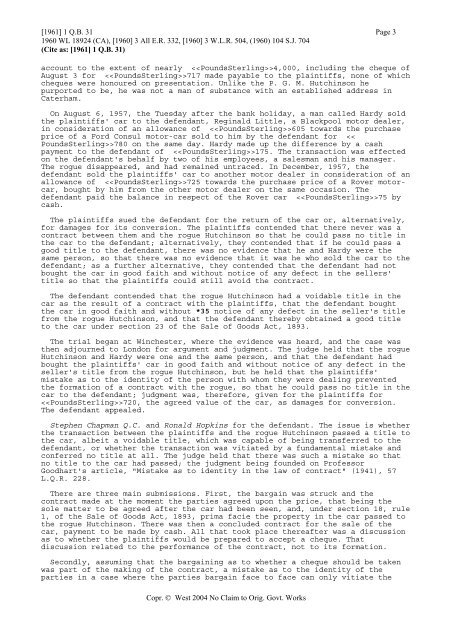Tesco v Constain - Thomson Reuters
Tesco v Constain - Thomson Reuters
Tesco v Constain - Thomson Reuters
Create successful ePaper yourself
Turn your PDF publications into a flip-book with our unique Google optimized e-Paper software.
[1961] 1 Q.B. 31 Page 31960 WL 18924 (CA), [1960] 3 All E.R. 332, [1960] 3 W.L.R. 504, (1960) 104 S.J. 704(Cite as: [1961] 1 Q.B. 31)account to the extent of nearly 4,000, including the cheque ofAugust 3 for 717 made payable to the plaintiffs, none of whichcheques were honoured on presentation. Unlike the P. G. M. Hutchinson hepurported to be, he was not a man of substance with an established address inCaterham.On August 6, 1957, the Tuesday after the bank holiday, a man called Hardy soldthe plaintiffs' car to the defendant, Reginald Little, a Blackpool motor dealer,in consideration of an allowance of 605 towards the purchaseprice of a Ford Consul motor-car sold to him by the defendant for 780 on the same day. Hardy made up the difference by a cashpayment to the defendant of 175. The transaction was effectedon the defendant's behalf by two of his employees, a salesman and his manager.The rogue disappeared, and had remained untraced. In December, 1957, thedefendant sold the plaintiffs' car to another motor dealer in consideration of anallowance of 725 towards the purchase price of a Rover motorcar,bought by him from the other motor dealer on the same occasion. Thedefendant paid the balance in respect of the Rover car 75 bycash.The plaintiffs sued the defendant for the return of the car or, alternatively,for damages for its conversion. The plaintiffs contended that there never was acontract between them and the rogue Hutchinson so that he could pass no title inthe car to the defendant; alternatively, they contended that if he could pass agood title to the defendant, there was no evidence that he and Hardy were thesame person, so that there was no evidence that it was he who sold the car to thedefendant; as a further alternative, they contended that the defendant had notbought the car in good faith and without notice of any defect in the sellers'title so that the plaintiffs could still avoid the contract.The defendant contended that the rogue Hutchinson had a voidable title in thecar as the result of a contract with the plaintiffs, that the defendant boughtthe car in good faith and without *35 notice of any defect in the seller's titlefrom the rogue Hutchinson, and that the defendant thereby obtained a good titleto the car under section 23 of the Sale of Goods Act, 1893.The trial began at Winchester, where the evidence was heard, and the case wasthen adjourned to London for argument and judgment. The judge held that the rogueHutchinson and Hardy were one and the same person, and that the defendant hadbought the plaintiffs' car in good faith and without notice of any defect in theseller's title from the rogue Hutchinson, but he held that the plaintiffs'mistake as to the identity of the person with whom they were dealing preventedthe formation of a contract with the rogue, so that he could pass no title in thecar to the defendant; judgment was, therefore, given for the plaintiffs for720, the agreed value of the car, as damages for conversion.The defendant appealed.Stephen Chapman Q.C. and Ronald Hopkins for the defendant. The issue is whetherthe transaction between the plaintiffs and the rogue Hutchinson passed a title tothe car, albeit a voidable title, which was capable of being transferred to thedefendant, or whether the transaction was vitiated by a fundamental mistake andconferred no title at all. The judge held that there was such a mistake so thatno title to the car had passed; the judgment being founded on ProfessorGoodhart's article, "Mistake as to identity in the law of contract" (1941), 57L.Q.R. 228.There are three main submissions. First, the bargain was struck and thecontract made at the moment the parties agreed upon the price, that being thesole matter to be agreed after the car had been seen, and, under section 18, rule1, of the Sale of Goods Act, 1893, prima facie the property in the car passed tothe rogue Hutchinson. There was then a concluded contract for the sale of thecar, payment to be made by cash. All that took place thereafter was a discussionas to whether the plaintiffs would be prepared to accept a cheque. Thatdiscussion related to the performance of the contract, not to its formation.Secondly, assuming that the bargaining as to whether a cheque should be takenwas part of the making of the contract, a mistake as to the identity of theparties in a case where the parties bargain face to face can only vitiate theCopr. © West 2004 No Claim to Orig. Govt. Works
















